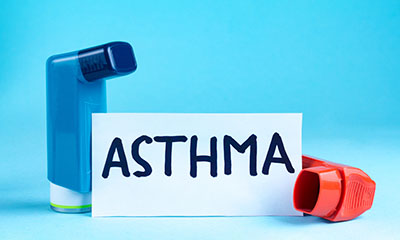BIRMINGHAM, Ala. – Parents must watch out for several illnesses during the winter, such as the flu or RSV. However, these infections may cause more severe symptoms in children with asthma. Doctors say it is important for patients to be on the proper medications and avoid triggers to control their asthma. This will reduce episodes of increased symptoms known as exacerbations or “flare-ups.”
“Some children tend to have more trouble during the cold weather season,” Dr. Terri Magruder, associate professor in the UAB Division of Pulmonary and Sleep Medicine at Children’s of Alabama, said. “That’s often because of increased respiratory infections circulating in our community during that time. Respiratory infections can increase airway inflammation, causing asthma symptoms that warrant additional medications and visits to the doctor. Washing hands frequently, avoiding sick friends and family members, and annual influenza vaccination are helpful tools to reduce illness.”
Magruder also said cold, dry air or the heating source in a house, such as fireplaces, wood-burning stoves or furnaces, can cause increased asthma symptoms for some children. Additionally, indoor allergen exposure may be more common during winter months.
If being outside in the cold air increases your child’s asthma symptoms, using a scarf over your child’s mouth and nose can help warm the air as your child breathes to reduce symptoms.
Asthma is a serious chronic disease that affects the airways, and it can cause wheezing, difficulty breathing and coughing. According to the Centers for Disease Control and Prevention, more than 4 million children under the age of 18 have been diagnosed with it. According to an article published in the National Library of Medicine last April, 11% of children in Alabama have asthma. The article also reports that Alabama children with asthma miss nearly 10 days of school each year for uncontrolled asthma. Magruder advises parents to talk to their child’s pediatrician or asthma specialist if they have any concerns.
“If your child is having increased symptoms at certain times of the year, it may be a sign they need a different medication to target their asthma symptoms,” Magruder said.
She also said parents should have an asthma action plan. The plan includes everything a family needs to know about the child’s symptoms and care.
“It’s really important for young children to have one because there are multiple caregivers who are often caring for these children,” Magruder said. “We often encourage families to take a picture of their asthma action plan when they leave the clinic and send it to caregivers, so everyone knows what the updated medicines are and how to manage their child’s event.”
You can find more information on managing the care and treatment of a child with asthma at www.childrensal.org/services/asthma-clinic/education-and-resources.




























